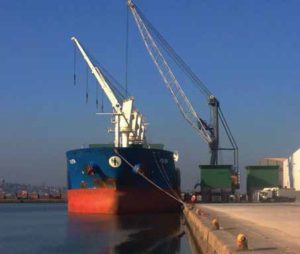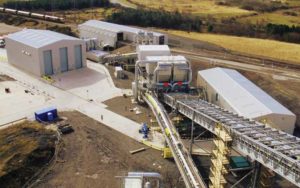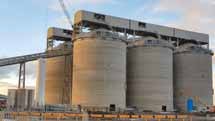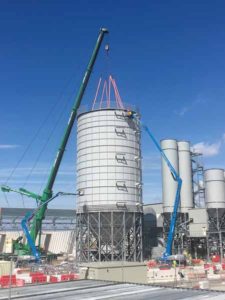Fairport Engineering Limited has, for more than 35 years, been involved in many industries where materials have had to be stored and processed. Over this time, bulk transport by road, rail and sea has played an important part in the projects that Fairport has designed and built. Fairport’s origins can be traced back to the 1980s when the UK coal industry serviced the national power industry. Virtually every colliery was then, in some way, linked to a power station and the majority of steam raising coal was transported between the two by ‘merry- go-round’ trains. Nowadays the few coal- fired power stations that remain are linked to ports and use imported coal from many parts of the world. Not that this has halted Fairport’s involvement with modern-day coal-handling systems.
A recent Fairport innovation, known colloquially as ‘The Plough’, has managed to reduce demurrage  costs when unloading coal from Panamax dry bulk carriers at ABP’s Port of Immingham in the UK. This device, pictured above, is fitted to a belt conveyor and consists of a metal detector that senses in ‘real time’ tramp metal pieces as they are discharged with the coal from the vessel. A down-stream ‘belt plough’ is then activated for a short period to discharge the increment containing the metal down a side-chute to a safely contained compound. This allows the discharge of the vessel to continue uninterrupted at maximum rate and the contaminated coal to be subsequently searched off line.
costs when unloading coal from Panamax dry bulk carriers at ABP’s Port of Immingham in the UK. This device, pictured above, is fitted to a belt conveyor and consists of a metal detector that senses in ‘real time’ tramp metal pieces as they are discharged with the coal from the vessel. A down-stream ‘belt plough’ is then activated for a short period to discharge the increment containing the metal down a side-chute to a safely contained compound. This allows the discharge of the vessel to continue uninterrupted at maximum rate and the contaminated coal to be subsequently searched off line.

Ports are relied on to handle a diverse range of materials from the vessels to shore, ideally through equipment that is reliable and flexible. Fairport’s mobile hoppers are found in ports across the UK, handling biomass, agri-feed stuffs, grain and other dusty materials, many of which have ATEX and DSEAR classifications. These hoppers can either discharge into road vehicles, mobile or static dockside conveyors or rail wagons. The mobile hoppers can be self-powered or towed; they may include self-steering capability and are designed to work with specific grab sizes to contain dust from the bulk cargoes. One bulk  commodity, the volumes of which have significantly grown over recent years, is biomass, particularly wood pellets; mainly at the expense of coal for use in power generation. Lynemouth Power Station’s recent conversion from coal requires biomass pellets to be imported using primarily rail but also, in smaller quantities, by road. Fairport designed and engineered the new rail-unloading facility and three road vehicle discharge stations for this project. All these systems incorporated dust containment and spark prevention measures in view of the wood pellets’ physical properties. These new rail and road facilities are shown in the photograph above.
commodity, the volumes of which have significantly grown over recent years, is biomass, particularly wood pellets; mainly at the expense of coal for use in power generation. Lynemouth Power Station’s recent conversion from coal requires biomass pellets to be imported using primarily rail but also, in smaller quantities, by road. Fairport designed and engineered the new rail-unloading facility and three road vehicle discharge stations for this project. All these systems incorporated dust containment and spark prevention measures in view of the wood pellets’ physical properties. These new rail and road facilities are shown in the photograph above.
The systems described so far all focus on the movement of bulk materials by various forms of transport — sea, rail and road — all with markedly different carrying capacities. Transshipment of bulk materials between these types of transport very rarely happens instantaneously and in most cases requires some form of intermediate storage between the transport modes. Fairport has engineered many types of storage systems for a wide range bulk materials including ground stores and elevated bunkers and silos. Two recent projects epitomize this particular skill; one (shown left) being six slip formed, concrete, waffle bottomed mass flow silos for biomass at Lynemouth Power Station. Each silo contains 12,500m3/8,500t of wood pellets that in total can sustain the station’s operation for nearly a fortnight.

The other (shown left) is part of the construction raw materials intake project being established at the new Hinkley Point C power station. It is of bolted steel construction and is intended to hold some 5,000 tonnes of GGBS (ground granulated blast furnace slag) that will be used in the on-site cement batching process. Fairport has been at the forefront of development in the bulk materials handling industry technology for 35 years, and continues to do so; enhancing for its clients profitability, availability, reliability and reducing energy, emissions and costs for marine, rail and road transport operators.





